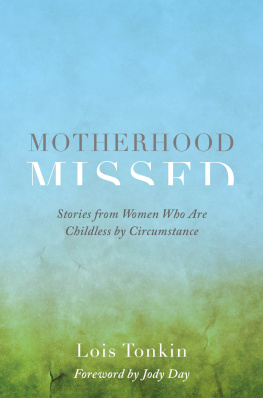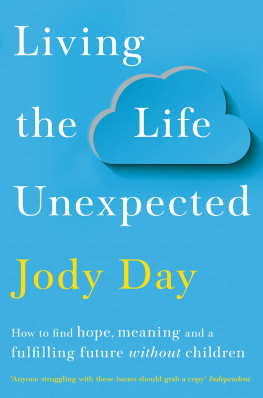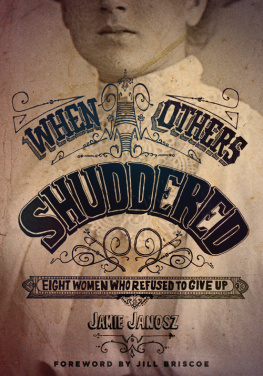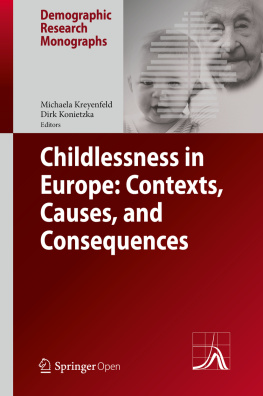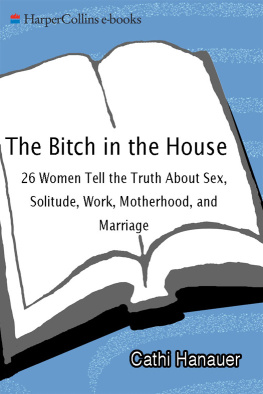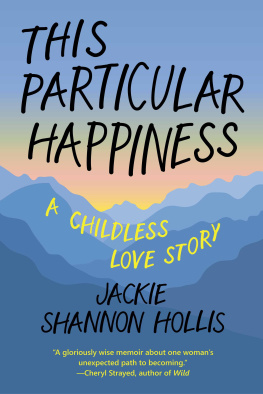
MOTHERHOOD
MISSED
Stories from Women Who Are
Childless by Circumstance
Lois Tonkin
Foreword by Jody Day

Jessica Kingsley Publishers
London and Philadelphia
Contents
Foreword
It is an honour to write the foreword for what I believe is a very important book. It is the first time that so many personal testimonies to one of the biggest untold stories of our generation are gathered together the stories of women who are childless by circumstance.
I first came across Lois Tonkins work exploring the disenfranchised grief of childless women in her doctoral thesis and I referenced it in the second edition of my book Living the Life Unexpected: 12 Weeks to Your Plan B for a Meaningful and Fulfilling Future Without Children published in 2016. It turns out that on the other side of the world, she was paying close attention to my work too, and it was with delightful mutual recognition that we found ourselves sitting next to each other at the first FertilityFest.com in the UK in 2016, as I was waiting to go up and give my talk. We struck up both a friendship and a professional collaboration and I trusted her with introductions to some of the women whose stories you are about to read.
When I published my first blog for Gateway Women back in April 2011, I had no idea what a huge taboo I was breaking by being open about my situation. I used my real name, my real photo and told my real story. And women from all over the world wrote back and said, me too. There didnt even seem to be a language yet to describe the situation that so many childless women found themselves in, of being childless not by choice, yet not really having ever felt that theyd had a clear choice in the matter. I would refer to it initially as, a rock and a hard place choice.
When so many of us are told, aggressively and unhelpfully, by others who fail to appreciate the complexity of the context of those hard choices, Yes, you did make a choice, you could have had a baby if youd tried harder/adopted/had a baby on your own, and so on, its hard to come back from that and decide that this person is offering a safe space to lay out the full picture; to say, Spend half an hour listening to this, and see if you can really see better choices I could have made at each point, with the knowledge and resources that were available to me at the time. And of course, in this case, a better choice is always one that is implied to be the one that leads to motherhood. Being childless, whether by choice or not, is still seen as a deviant feminine identity and one to be avoided at all costs. This is the powerful conditioning of the unquestioned and often unseen pronatalist ideology that runs through all our thinking and judgments about motherhood and non-motherhood.
It became clear to me early on that medical infertility was but that refers more narrowly to the experience of not having a partner to have children with. Childless by circumstance is a systemic term, and this is a systemic issue.
Something that Ive noticed since I first started reading and contributing to the media around the issues of childlessness is that gradually the narrative has changed, and its still evolving. Whereas at first the reporting was mostly about childfree by choice women and how shocking and wonderful their lives were, gradually the stories of women who had tried to have a family using fertility treatments and had failed were starting to appear. The childfree women were painted as exciting and outrageous, with lots of money, wonderful figures and great careers (but unfeminine, ambitious, and destined to die alone), the childless women as failed women, denied the ultimate expression of their femininity, physically and emotionally broken, their lives permanently destroyed. Didnt want couldnt have: a straightforward dichotomy of the feminine experience and both entirely defined by motherhood. However, the stories of childless by circumstance women were entirely absent, as were (and still are) the stories of women like me who had wanted to become mothers and had found a way to grieve that loss and move forward with their lives in new and personally fulfilling ways.
Yet now, gradually, the grey areas are emerging between (and within) these stories. And the biggest grey area is that of being childless by circumstance. And when I say the biggest, I mean numerically too Professor Renske Keizers research coming out of the Netherlands experience as someone who has heard many thousands of personal testimonies like the ones Lois shares in this book.
Through my work, I have become the silent vault of so many stories. They have not been mine to share; my role has been to hear them and bear witness to them without closing down the teller with shaming judgments or unhelpful advice. After a morning of such stories in a Gateway Women workshop, I imagine red threads of connection creating a metaphorical cats cradle across the circle of women: shared experiences of abortion; of successive monogamous partnerships ending without reaching the point of starting a family; of childhood trauma leading to lost decades of potentially fertile womanhood; of partners who already have children and dont want more; of heartbreaking relational wounding by unhappy and narcissistic mothers; of long-term unchosen singleness, dependent siblings, failed adoptions and economic precariousness. In all that time, I havent met a single career woman or a woman who left it too late (knowingly), and you wont find those in this book either. Thats a social trope, like the crazy cat lady, and one that entirely misses the systemic context of involuntary childlessness and instead places all the blame (and a huge dollop of shame) on the individual. I see this in how each woman who comes into the workshop feeling alone and shameful about how she messed up her chance at motherhood, leaves having heard other womens stories and, in noticing her own empathy, understanding and appreciation of that complexity, begins to imagine that maybe her story deserves the same. That is the power of testimony.
and Ive come to see how the shame that childless by circumstance women feel has a powerful silencing effect on them, which contributes not only to their own pain and isolation, but also to their ability to heal. Because the social censure of childlessness is a collective process, so the healing from childlessness needs to have a social element too. We need to hear each others stories to feel supported that the rock-and-ahard-place choices that weve faced were not because we were stupid or careless, but because human life is complex and choices never happen in a vacuum.
The media, quite naturally, is not the place for a complex unpacking of the systemic issues that the choices of modern women operate within. Time and time again when Ive been interviewed by the press, an intelligent journalist has understood this and written a thoughtful paragraph to that effect. And nearly every single time, the editor has removed it, slapped a click-bait headline on it, and left instead the simplistic pronatalist narratives of didnt want, couldnt have or, more recently, women who left it too late (to trivialize the experience of childless by circumstance women). Very recently I contributed extensively to a major article for the left-leaning, intellectual British Sunday newspaper The Observer on the experience of being a woman without children, by choice or not, on Mothers Day. The journalist and I had in-depth conversations about the social and systemic angles, hardly any of which made it into her final copy. And then when she did submit her commissioned piece, her editor said that she found it too gloomy and asked her to include a story of late motherhood working out against the odds. And Im sure you can guess which photo the picture editors used to illustrate the whole piece the mother and baby of course!
Next page
